Wix and Shopify are leaders in their respective branches: site building and ecommerce. However, users can build an online store in Wix or a website with Shopify. So, the question arises, which is better?
We already put Wix and Shopify to the test in our comparisons of the best site builders and ecommerce platforms. Now, we're putting the two solutions head-to-head and assessing them according to seven categories to decide once and for all which is the best for building an online store.

Shopify vs. Wix


Configuration & Usability
Sitebuilding software like Wix and Shopify is marketed to a very specific target group: Individuals lacking in programming knowledge for whom content management systems like WordPress are a bit too complicated. Through their visual editors, they make designing a website or online store as easy as possible. As such, intuitiveness is one of the most important criteria in assessing their value.
Wix's dashboard is quickly mastered
Wix makes a good start in this area: Setting up the service doesn't take long, and thanks to its beginner-friendly drag and drop capabilities, anyone can create a website with minimum effort. Of course, in comparison to ecommerce software, Wix's range of options and features might be slightly overwhelming at first.
Most shop-building software distinguishes ecommerce features from the design dashboard, whereas with Wix, the two overlap. Even though Wix has a dashboard, getting to important shop features requires a few clicks when working on your website. This makes sense though since Wix is for creating all kinds of websites, not just online shops.
In addition to its regular editor, Wix also offers an AI-assisted version for absolute beginners and an advanced development platform (Velo) with which you can add extra features and use APIs, both of which do require programming knowledge.
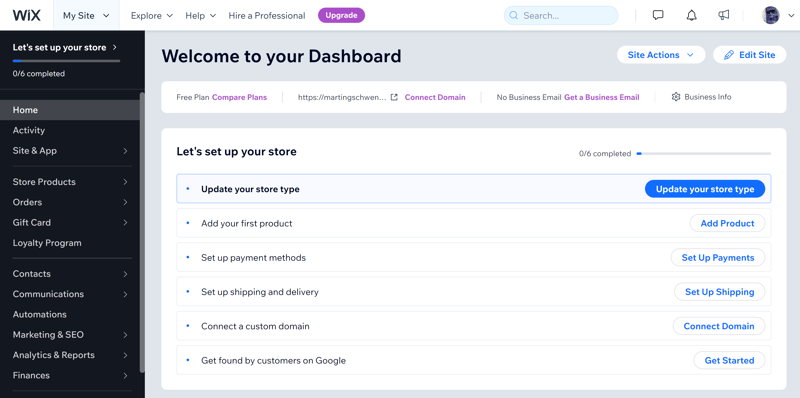
Wix's ecommerce and design features are accessed through the dashboard.
Shopify separates design and ecommerce
On Shopify, product management and ecommerce features are the main dashboard element, with the site builder playing a subordinate role. The service's usage concept is somewhat different than Wix's, meaning that those who are used to classic site builders will need to familiarize themselves with the platform's ecommerce features.
Overall though, Shopify's usage concept is straightforward: It doesn't take long to set up an account, the dashboard is well-structured, and the emphasis on ecommerce will definitely be welcomed by those looking to set up an online store.
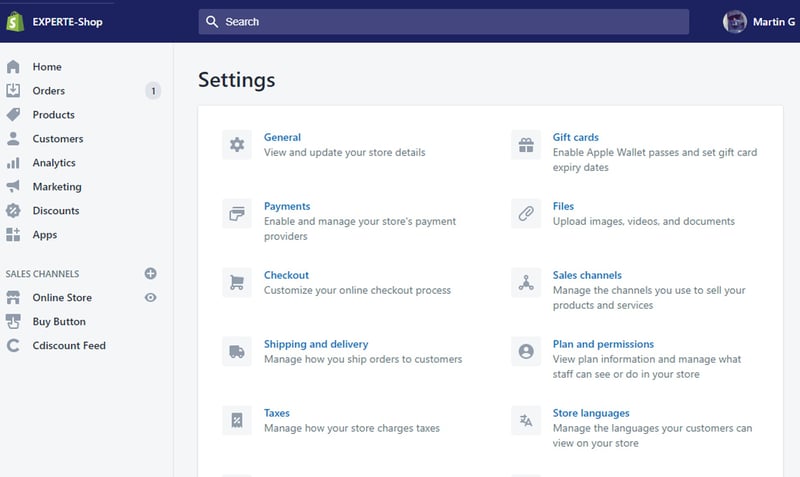
On Shopify, product management and sales features are center stage.
As we've already said, user-friendliness is one of, if not the most important factor in determining a site builder's value: Beginners might find their feet faster with Wix, since its user interface handles the front and backend less abstractly. By the same token though, Shopify impresses with its logically structured dashboard and intuitive e-commerce features.
Winner: Draw
Design & Customization
When it comes to actually building your online store or website, the selection and quality of design templates on offer play a key role.
800+ templates from Wix
In terms of quantity, Wix is far ahead of Shopify, serving up more than 800 different templates, all of which are subdivided into countless categories. More than 100 of these are for ecommerce. Generally, not all templates are created for usage with online stores in mind, however thanks to the flexibility of Wix's site builder, you can easily add a shop to an existing website.
Owing to the sheer number of options to choose from, we noticed several that didn't impress us to the same extent as some of the others, along with quite a few that looked rather similar to one another. Still, the overall quality of templates is solid.
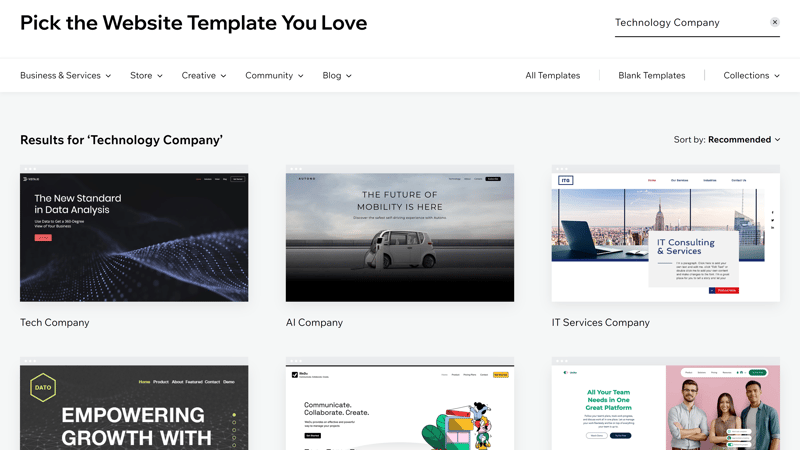
Wix offers a huge selection of design templates.
Less choice on Shopify
Turning to Shopify, the assortment of themes offered is much smaller: Slightly more than 100 are available, only 10 of which are free. This makes it likely that you'll need to pay extra for the template that you want for your store. In terms of quality, Shopify's themes are excellent.
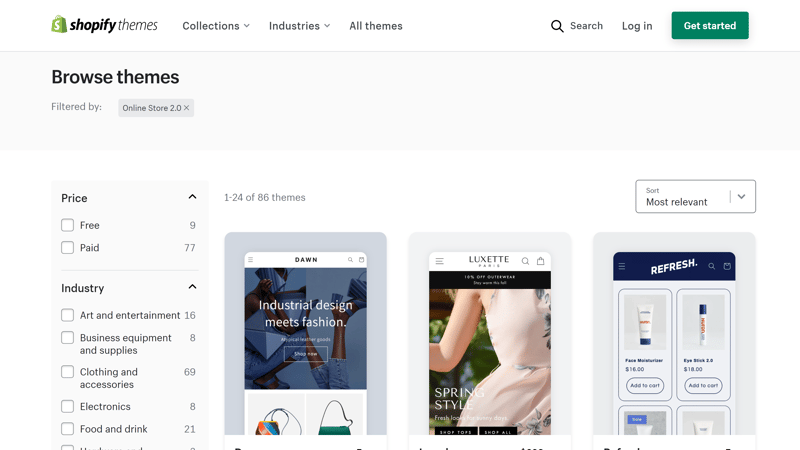
On Shopify, both free and paid themes are offered.
Wix flexes its muscles
Of course, selecting a template is just the beginning, as you'll almost certainly want to customize it to your exact preferences and specifications. Here, Wix offers considerably more flexibility: Its drag and drop editor allows users to freely move and place elements anywhere they want. And the selection of elements is huge, covering much more than just the basics (such as an image gallery, testimonials, and product galleries).
In case there are elements that you want your template to have, but are not offered by Wix, you can pay its App Market a visit. There, you'll be able to enhance a template's functionality by adding photo galleries and video libraries, search bars, and content blocks (such as "Opening Hours"), as well as marketing tools.

Wix puts in a strong performance when it comes to customization.
Once accustomed to the freedom that Wix's drag and drop editor offers, it's hard to work more indirectly with templates through a design menu, as is the case in Shopify. You can replicate the drag and drop experience in Shopify, but you'll need to download apps from the App Store.
All the same, Wix is better equipped for customization, even when it comes to an online store. After all, the Israeli site builder needs to be more multi-faceted since it can be used to build any sort of website, not just an ecommerce one.
Winner: Wix
Product Management
Ecommerce platforms need to offer logical and useful product management tools since this is ultimately where a proprietor or owner will spend most of their time. Being able to quickly list new arrivals or effortlessly specify color, size, or other variations are two capabilities that separate good ecommerce software from bad ecommerce software.
Shopify: Solid product management with flexible add-ons
Shopify makes it easy to create a clear product catalog, only requiring a few clicks to specify product variants or subdivide your inventory into different categories. In addition, you'll also be able to sell digital goods and services.
However, upon closer inspection, the service's product management isn't as comprehensive as it might seem. For example, you'll be limited to just 3 options for product variants, with some of Shopify's competitors offering much more. All the same, Shopify's App Store is home to numerous (free and paid) add-ons, covering just about every feature or capability you might want to have.
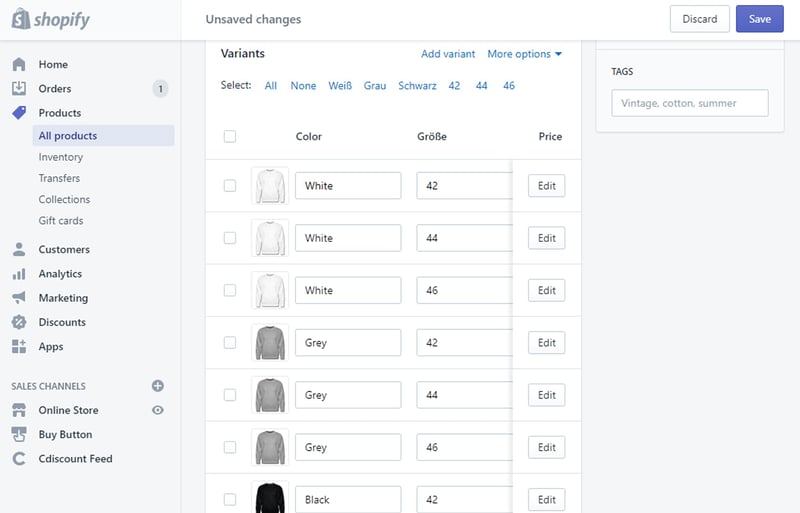
Product management in Shopify.
Wix covers the basics
When it comes to product management, Wix is also well-equipped: You can sell physical and digital products and even market regular subscriptions. In fact, creating different product variants is even easier and more comprehensive than with Shopify.
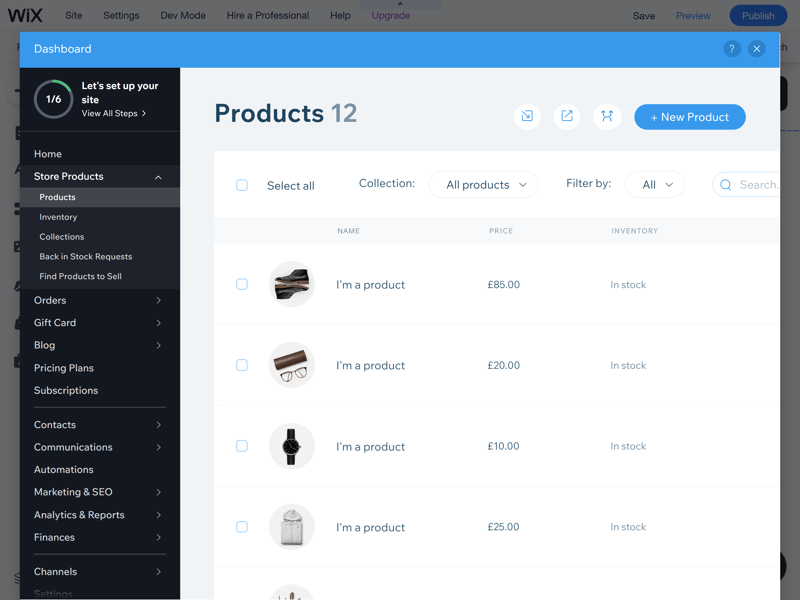
Product management in Wix.
When factoring in all of the add-ons that are available, Shopify emerges as the more versatile ecommerce platform, making it possible to easily and flexibly present your wares.
Winner: Shopify
Sales Options
In order to effectively sell your products and operate a legitimate online store, your site builder or ecommerce platform needs to offer certain basic features.
Payments and sales channels: Shopify dominates
It's generally considered best practice to offer customers as many payment methods as possible. Here, Shopify has the edge: While both platforms operate their own payment systems and support PayPal and credit cards, Shopify offers a few options that Wix doesn't (such as Google Payments).
Wix's point-of-sale (POS) solution also demonstrates a few weaknesses. So far as supporting sales channels is concerned, Shopify excels, allowing users to conduct business on Amazon, TikTok, Etsy, and Pinterest, while Wix only offers Instagram and Facebook (both of which Shopify also covers).
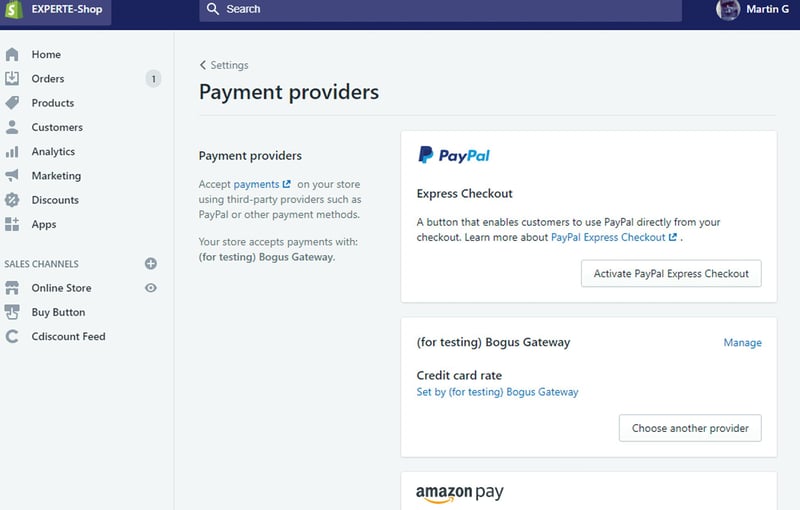
Shopify's sales options are both more comprehensive and detailed than Wix's.
In other aspects (such as delivery options and tax settings), there's little separating Shopify and Wix. When using the latter, you'll need to install apps for several of the features that the former comes integrated with. Overall, Shopify clearly dominates when it comes to sales options.
Wix excels in terms of marketing features
Of course, you can only start selling when customers know what you have to offer. This is where marketing features can play a major role, elevating the work you've done on designing and stocking your online store. Wix offers a powerful marketing platform called Ascend. In addition to coupons and discounts, you can also engage in email marketing, use SEO tools, and even create high-quality promotional videos and social media posts.
Shopify also offers a range of marketing features, however, you'll often need to use external apps to access them.
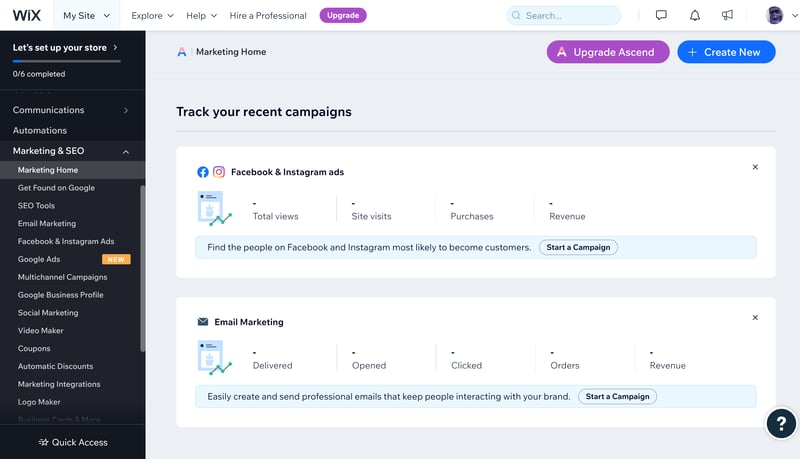
Wix's Ascend provides a powerful marketing platform that's embedded in the site builder.
Even though Wix's all-in-one marketing solution is impressive, Shopify carries the round. Judging purely on ecommerce, its sales options and features are robust out of the box, not requiring the download of any third-party apps or integrations.
Winner: Shopify
Customer Support
For us, good support is comprised of two equally important elements: Helpful static content, like tutorials and FAQs that explain the ins and outs of a platform and live support, available via chat or phone.
Starting with the first type of support, both services do equally well: Their help centers are full of insightful and informative content ranging from tutorials to video guides, online courses, and blog entries. Wix's support is embedded directly in the editor, making it possible to read an article related to the page you're on (by clicking on the question mark) without needing to navigate to a different tab.
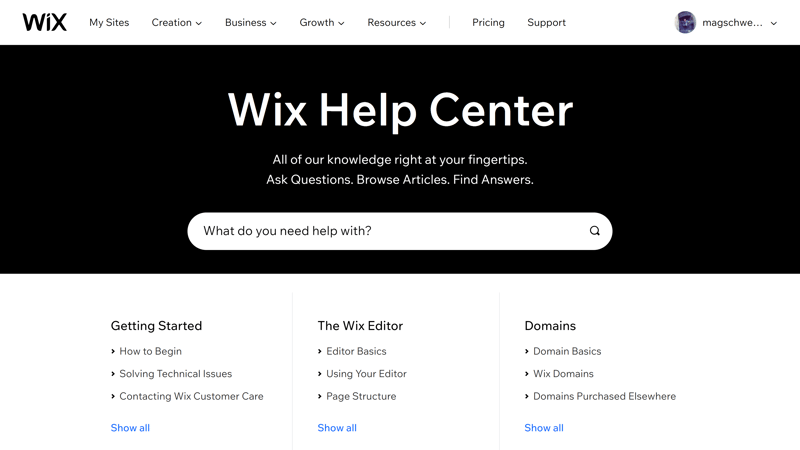
We had positive experiences with Wix's support.
Turning to direct support, Shopify had something of a hiccup: We had to wait 12 days for an email response to our query. Unfortunately, response times seem to be something of a general issue for the platform, as we waited more than 40 minutes for a (very competent) live chat support staffer. On Wix, after about 30 minutes, our query was answered.
As such, the round goes to Wix.
Winner: Wix
Pricing
Comparing the two providers' pricing is difficult since each plan comes with different features. For that reason, we've compared the rates from Wix and Shopify in detail:
Shopify Pricing
Shopify offers three plans: Basic, Shopify, and Advanced. These mostly vary in terms of the number of staff accounts, either 2, 5, or 15, along with a few other features. Ecommerce automations are only available starting with Shopify, while Advanced offers subscribers third-party calculated shipping rates.
Transaction fees are charged when using an external payment gateway, but not Shopify Payments. For the former, Basic users pay 2%, Shopify users 1%, and Advanced users 0.5%.
Below, we've prepared an overview of all of Shopify's rates:
| Basic | Grow | Advanced | |
|---|---|---|---|
| Monthly Price | from $29.00 | from $79.00 | from $299.00 |
| Transaction fee | - | - | - |
| Contract Period (Months) | 1 - 12 | 1 - 12 | 1 - 12 |
| Product Management | |||
| Number of products | unlimited | unlimited | unlimited |
| Product filters | ✓ | ✓ | ✓ |
| Product variants | ✓ | ✓ | ✓ |
| Product inventory | ✓ | ✓ | ✓ |
| Product reviews | ✓ | ✓ | ✓ |
| Internationalization | |||
| Multiple languages | ✓ | ✓ | ✓ |
| Multiple currencies | ✓ | ✓ | ✓ |
| Automatic tax calculation | ✓ | ✓ | ✓ |
Wix Pricing
Wix distinguishes between website and ecommerce/business packages. If you'd like to set up an online store, you'll need to purchase one of the latter. Three options are offered for these: Business Basic, Business Unlimited, and Business VIP.
All three include unlimited bandwidth and products, with varying amounts of storage space (20 GB, 30 GB, and 50 GB, respectively).
Some features, such as subscriptions, additional currencies, or advanced delivery options, are only available starting with the Business Unlimited plan. Business VIP customers receive customized reports and priority customer care.
Payment fees depend on the provider you select. With Wix Payments, you'll be charged 1.9% of each transaction plus $0.30.
Below, we've prepared a summary of Wix's pricing:
| Core | Business | Business Elite | |
|---|---|---|---|
| Monthly Price | from $11.75 | from $15.50 | from $55.00 |
| Transaction fee | - | - | - |
| Contract Period (Months) | 1 - 36 | 1 - 36 | 1 - 36 |
| Product Management | |||
| Number of products | 50,000 | unlimited | unlimited |
| Product filters | ✓ | ✓ | ✓ |
| Product variants | ✓ | ✓ | ✓ |
| Product inventory | ✓ | ✓ | ✓ |
| Product reviews | ✓ | ✓ | ✓ |
| Internationalization | |||
| Multiple languages | ✓ | ✓ | ✓ |
| Multiple currencies | ✗ | ✗ | ✗ |
| Automatic tax calculation | ✓ | ✓ | ✓ |
As you can see, Wix is more affordable, winning this round.
Winner: Wix
Customer Ratings
On the review portals that we consulted, Wix enjoys better ratings. This is largely owing to their Trustpilot reviews. By the same token, Shopify performed poorly on Trustpilot, with considerable criticism directed at its customer support (or lack thereof). Unfortunately, this overlaps with our own experiences.
Below, we've summarized the customer reviews we found for both platforms:
Shopify customer ratings
Wix customer ratings
Conclusion
What's better: Wix or Shopify? On paper, the answer is clear, with Wix winning four rounds, Shopify two, and one, a tie.
Wix is the better platform if you're looking for a relatively affordable ecommerce solution with a powerful site builder and comprehensive design features.
However, since Shopify carried the categories that are most essential to ecommerce, namely, product management and sales options, for purely business projects, it's likely to be the stronger choice.
We recommend Shopify for:
Large online shops that need more delivery, payment, and tax features
Ambitious ecommerce projects looking to scale up over time
On the other hand, Wix is better if you want:
A more affordable ecommerce solution for a smaller store
To create a regular website with an embedded shop
More flexibility and choice in design
If you'd like more information about Wix and Shopify, or any of the other platforms we reviewed, be sure to check out our comprehensive assessments of the best ecommerce platforms.










